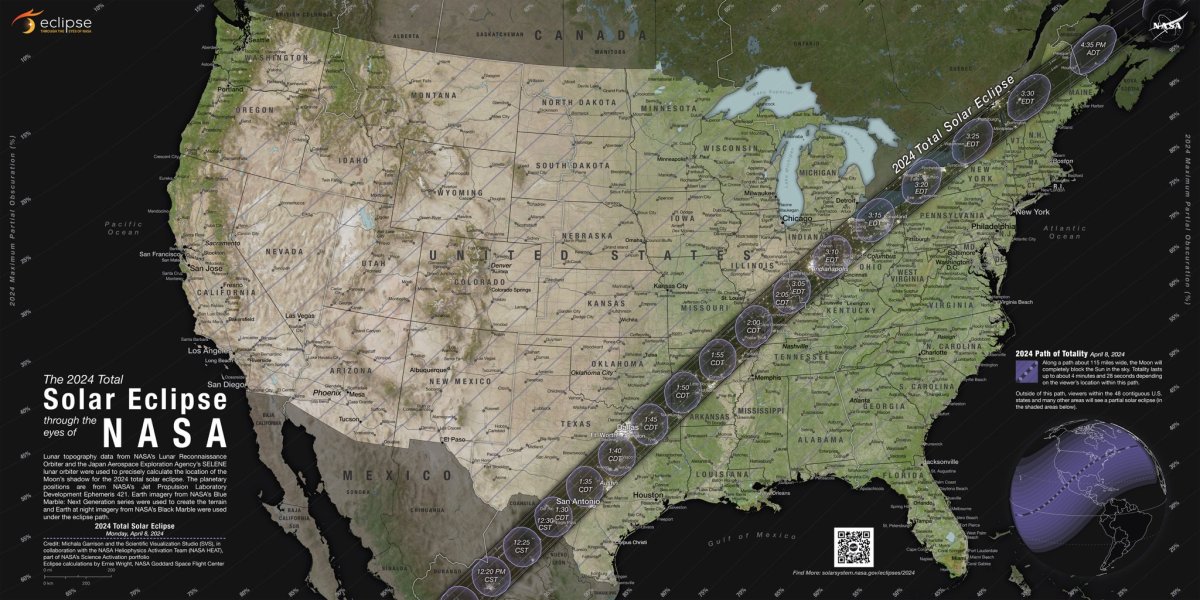Officials in Maine have issued safety warnings ahead of next week's total solar eclipse.
On April 8, millions of Americans will find themselves plunged into temporary darkness as a rare total solar eclipse occurs. The eclipse, the first of its kind in the U.S. since 2017, will cross the continent of North America, beginning in Mexico before entering the U.S., affecting 13 states and leaving the Northeast to enter Canada.
In a release, Maine Governor Janet Mills offers safety advice for the event, as residents and visitors will find themselves in the path of totality as the moon completely blocks out the sun.
In the U.S., the eclipse will start in Texas at around 1:30 p.m. CT and then follow a path that crosses Oklahoma, Arkansas, Missouri, Illinois, Kentucky, Indiana, Ohio, Pennsylvania, New York, Vermont, New Hampshire, and finally Maine. Maximum totality will occur in Maine at around 3:30 p.m. ET, passing directly over the city of Caribou at 3:33.

Ahead of the eclipse, Maine residents have been urged to plan ahead. Travel is likely to be difficult on that day given the large number of people traveling to witness the event. Motorists are urged to research their destination and find out where they may need to stop to buy fuel and other necessities.
As traffic is expected to be heavy, people are encouraged to pack an emergency kit in their vehicle in case of severe delays. Mills recommends including the following:
- Paper map
- Prescription medications and glasses
- First aid kit
- Cellphone and charger
- Water and snacks
- Books and games to occupy time during traffic delays
- Cash
Travelers are also urged not to rely on their phones and to take a paper map with them, as in the busiest areas cellphone towers may be overloaded and service is already unreliable in numerous areas in the path of totality.
Astronomy buffs are urged to use caution when viewing the eclipse by purchasing appropriate glasses so they don't damage their eyes. This advice is also backed by NASA, which strongly advises using "safe solar viewing glasses ('eclipse glasses') or a safe handheld solar viewer at all times.'

Those heading out to see the eclipse are also encouraged to dress appropriately, as temperatures can temporarily drop by around 10 degrees during maximum totality. What's more, officials have warned of "mud season" in Maine, with dirt roads unlikely to be passable for most motorists, who are encouraged to stay on paved roads at all times.
As many will be flocking to Maine's parks, eclipse viewers are urged to make themselves familiar with Maine state park guidelines. Do not go beyond your skill level if hiking to a viewing spot.
Nationwide, areas in the path of totality are expected to be extremely busy. With the rare astronomical phenomenon not expected to happen again in the contiguous U.S. until 2045, millions of Americans are expected to flock to the 13 states in the path of totality. The event is expected to be viewable to varying degrees across 90 percent of Maine, according to Mills.
"Maine is the best place in New England and one of the best places in North America to witness the historic solar eclipse," she said in her press release. "If you're planning to travel anywhere in Maine on April 8, now is the time to make plans so that you can safely and enjoyably experience this historic event."
She continued: "We recommend travelers arrive early and stay late, stick to paved roads, have a full tank of gas, pack a paper map, bring plenty of snacks and water, and, of course, wear appropriate eye protection. By taking these commonsense steps, you can ensure that you and family are able to safely enjoy this incredible event."
Uncommon Knowledge
Newsweek is committed to challenging conventional wisdom and finding connections in the search for common ground.
Newsweek is committed to challenging conventional wisdom and finding connections in the search for common ground.
About the writer
Aliss Higham is a Newsweek reporter based in Glasgow, Scotland. Her focus is reporting on issues across the U.S., including ... Read more





